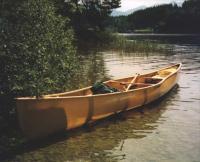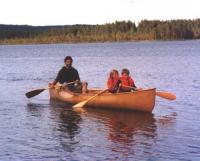Up: Reviews
Itasca
by Walter Ruckdeschel
General information:
As a specialist in building composite canoes for such demanding tasks as
marathon racing or wilderness tripping, We no nah has the Itasca in the
category "Specialty Canoes". And indeed, the word special matches
this canoe, designed by Eugene Jensen, in several ways:
at 19' length, 37'' maximum width (34 1/4'' at waterline) and 15'' center depth,
the resulting volume lies well beyond those of other "ordinary" canoes, and,
just to say, the beyond is also true for the price. We no nah states that the main fields
for this canoe are trips with lots of gear, paddling with more than two
persons (families) and tripping on large water bodies. If we compare the Itasca
to the Minnesota II it is slower but more stable in rough
water and it takes more gear along. Compared to the Champlain, the Itasca is
clearly faster.

Hull design:
The hull of the Itasca is showing a very detailed design, making it a unique
canoe, and, further, it is the basis for all handling characteristics described below.
The sharp and relatively high bow is followed by a gradual widening of the hull,
reaching it's maximum just behind the center of the boat. The stern, also, has
a sharp design. The eye is caught by the design of the gunwales: in the bow, there is a slight flare,
followed by slight tumblehome at the position of the bow paddler. Amidship
the gunwales are straight. The position of the stern paddler shows extreme tumblehome
which ends up in a slight flare in the stern. The rocker of 1 1/2'' and a flat round bottom
with smooth chines complete the design.
Materials and options:
Since the complexity of the design is enormous, the canoe is available in composite
materials only, however, building it in Royalex would result in a very heavy and
not very stiff hull. The Itasca is available in Tuf-weave (a fabric
consisting out of 50% polyester and 50% fiberglass) and Kevlar. Tuf-weave is cheaper,
not as light as and not as resistant as Kevlar. Whatever material you choose, the
method of stiffening is cruical to the performance of the canoe. For the Tuf-weave models you can choose
between Cross-Ribs and a Foam Core, Flex-Core and Foam-Core are available for the Kevlar variant.
The extremly rigid Foam-Core constructions are lighter than Flex-Core or Cross-Ribs, this
provides for better performance with the Foam-Core models. However, the rigid hull is
not as tough as the other constructions; sharp rocks and the like should be treated with caution.
Kevlar-Flex-Core is pretty good for allround tasks, but more bulky than the Foam-Core construction.
The best performance is obtained with Kevlar in the Ultra-light (Foam-Core with clear Gel-Coat) construction.
The trim is always made up of wood, thwarts in aluminum or wood (if wood, a yoke is also provided).
In the bow a sliding bucket seat is standart, in the stern its optional as well as the foot braces,
however it is a good investment. The Foam-Core versions show a very aesthetic and integrated
mounting of these items without rivets through the hull.
Paddle report:
I fully tested the Itasca on a number of lakes and slow moving rivers in Germany
and Scandinavia. We paddled the canoe in Kevlar Ultra-light with all wood trim and sliding seats
under very different weather conditions.
 At 24kg the canoe can be easily handled by one adult (strong wind excluded).
For long portages, a better yoke or yoke-pads are advisable.
One of the strong points is the very stiff Hull, combined with a good crafted wood trim.
The empty boat provides for good initial stability, however, it is not extremely high
(compared to other canoes like the Revelation).
If you get into the boat, you will notice the narrow hull, that provides for
easy and efficient paddling technique. Therefore, also small persons (kids)
are allowed to paddle in the Itasca. The end-stability is extreme. You can heel
the canoe until the gunnels touch the water, and the boat will do nothing unexpected.
Unloaded, you will paddle a very fast canoe, still easy to turn (with appropriate technique).
You can paddle sit 'n switsch for high cruising speeds as well as conventional technique.
In high waves the boat will run dry due to the high bow.
When only slightly loaded, the Itasca is easily blown out of course by wind,
however, if you paddle it loaded, the problem is not present.
At 24kg the canoe can be easily handled by one adult (strong wind excluded).
For long portages, a better yoke or yoke-pads are advisable.
One of the strong points is the very stiff Hull, combined with a good crafted wood trim.
The empty boat provides for good initial stability, however, it is not extremely high
(compared to other canoes like the Revelation).
If you get into the boat, you will notice the narrow hull, that provides for
easy and efficient paddling technique. Therefore, also small persons (kids)
are allowed to paddle in the Itasca. The end-stability is extreme. You can heel
the canoe until the gunnels touch the water, and the boat will do nothing unexpected.
Unloaded, you will paddle a very fast canoe, still easy to turn (with appropriate technique).
You can paddle sit 'n switsch for high cruising speeds as well as conventional technique.
In high waves the boat will run dry due to the high bow.
When only slightly loaded, the Itasca is easily blown out of course by wind,
however, if you paddle it loaded, the problem is not present.
Conclusion:
The Itasca is a versatile canoe, that can be paddled with lots of gear and, in addition,
with kids or three persons. Draw backs are the extreme pice, and possible
difficulties in Storage. The canoe is OK for beginners, as long as they are willing to learn the
needes technique.
Up: Reviews
© copyright 2001 Walter Ruckdeschel

 At 24kg the canoe can be easily handled by one adult (strong wind excluded).
For long portages, a better yoke or yoke-pads are advisable.
One of the strong points is the very stiff Hull, combined with a good crafted wood trim.
The empty boat provides for good initial stability, however, it is not extremely high
(compared to other canoes like the Revelation).
If you get into the boat, you will notice the narrow hull, that provides for
easy and efficient paddling technique. Therefore, also small persons (kids)
are allowed to paddle in the Itasca. The end-stability is extreme. You can heel
the canoe until the gunnels touch the water, and the boat will do nothing unexpected.
Unloaded, you will paddle a very fast canoe, still easy to turn (with appropriate technique).
You can paddle sit 'n switsch for high cruising speeds as well as conventional technique.
In high waves the boat will run dry due to the high bow.
When only slightly loaded, the Itasca is easily blown out of course by wind,
however, if you paddle it loaded, the problem is not present.
At 24kg the canoe can be easily handled by one adult (strong wind excluded).
For long portages, a better yoke or yoke-pads are advisable.
One of the strong points is the very stiff Hull, combined with a good crafted wood trim.
The empty boat provides for good initial stability, however, it is not extremely high
(compared to other canoes like the Revelation).
If you get into the boat, you will notice the narrow hull, that provides for
easy and efficient paddling technique. Therefore, also small persons (kids)
are allowed to paddle in the Itasca. The end-stability is extreme. You can heel
the canoe until the gunnels touch the water, and the boat will do nothing unexpected.
Unloaded, you will paddle a very fast canoe, still easy to turn (with appropriate technique).
You can paddle sit 'n switsch for high cruising speeds as well as conventional technique.
In high waves the boat will run dry due to the high bow.
When only slightly loaded, the Itasca is easily blown out of course by wind,
however, if you paddle it loaded, the problem is not present.